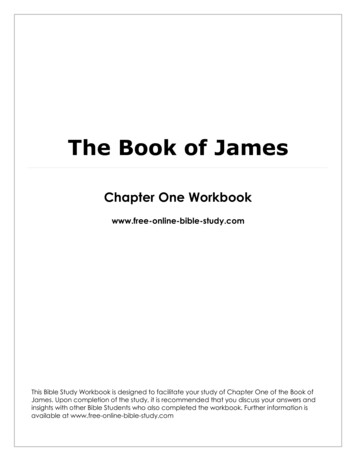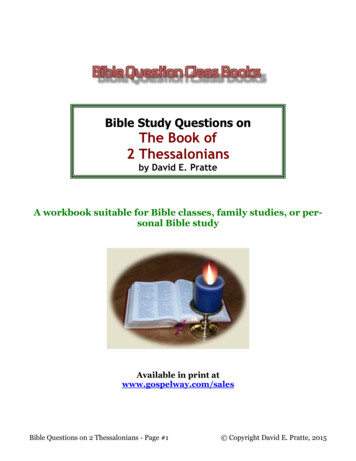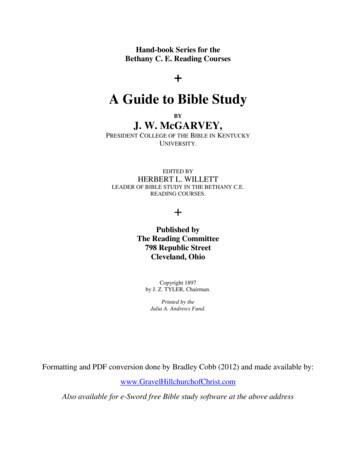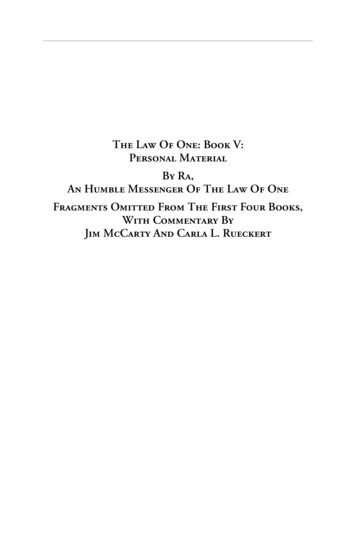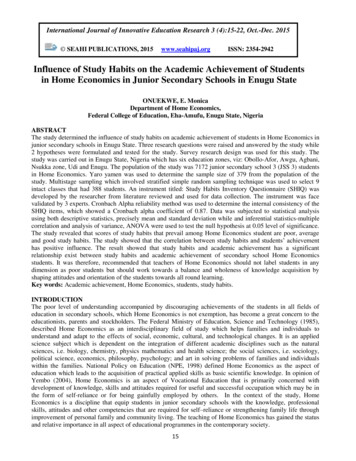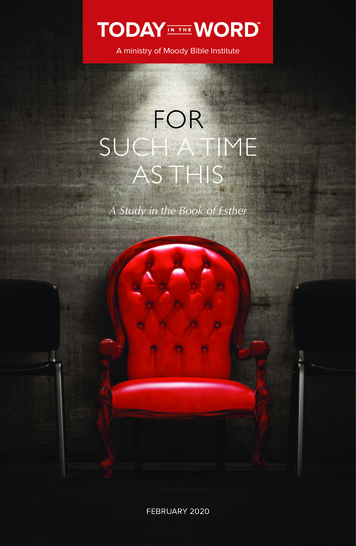
Transcription
A ministry of Moody Bible InstituteA Study in the Book of EstherFEBRUARY 2020
Today with Mark JobeBe Someone God Can UseFrom the President of Moody Bible Institute“The church is not just a place where we learn,but also where we mobilize people for kingdom activity.”Have you evernoticed that Godchooses the mostunlikely people todo His work? Moseswas commanded byGod to confront themighty Pharaoh. I’msure he was stunned. Why would Godchoose a man who stumbled over hiswords to deliver His demand (Ex. 4:10)?In the New Testament, we meetMary—a young woman engaged to bemarried—to be the mother of Jesus. I’msure Mary wondered why God chose herfor this important task. But as he deliversthis unexpected news, Gabriel called her“highly favored” by God (Luke 1:28).The fact is that God often usesordinary people like you and me to doHis work! As you will see in this month’sissue, Esther was one of those people.Young and beautiful, Esther was placedin a life-or-death situation. I’m sure shewondered why God would put sucha heavy weight of responsibility onher shoulders.But the Bible clearly tells us thatEsther was chosen by God for “sucha time as this” (Est. 4:14). God had apurpose and a plan for Esther’s life and(800) 356-6639He chose her to accomplish His will.Through Esther, God’s people would besaved. Esther was God’s change agent.Friends, we live in a time when Godneeds willing servants to take bold stepsfor Him. One complaint often givenabout the church is that we can be alltalk and no action. That should not bethe case! The church is not just a placewhere we learn, but also where wemobilize people for kingdom activity.This is clearly expressed in the GreatCommission (Matt. 28:16–20).The church’s job is to make surethat people who do not know God comeinto relationship with Him and see theirlife transformed by His power. But thiswork is not a once-and-done event. Theresulting change should seep into ourmarriages, our families, our workplaces.As more and more people within thechurch are transformed by God, theybegin to influence their environment.The church of the living God is apowerful force for change. And Godhas called you and me to be His changeagents. No matter what your limitations,God can use you to serve Him. He isnot looking for perfect candidates, He’slooking for committed disciples, willingto serve for such a time as this.
Practical TheologyGod in the Shadowsby Dr. John Koessler“Sovereignty is the power and authority by which Godbends all things toward His good purpose.”One of the unique characteristics ofthe book of Esther is the absence ofany mention of God. In Esther’s story,God’s involvement is implicit ratherthan explicit. For example, when Estherasks the Jews to fast, we can assumethis included prayer (Est. 4:16). The fateof God’s chosen people is at the verycenter of the story, but God seems toremain in the shadows. Even so, Estherteaches about God’s sovereignty.The sovereignty of God involvesmany of His divine attributes, includingHis omniscience and omnipotence.In Psalm 139:16, David expresseswonder at the thought that “all thedays ordained for me were written inyour book.” Sovereignty is the powerand authority by which God bends allthings toward His good purpose. Thisdoes not mean that every event in ourlives is itself good. Nor does it meanthat we have no individual will or moralaccountability. Sovereignty does meanthat God orchestrates our circumstancesand works through our actions in orderto propel His own redemptive purposes.One of the clearest proofs of thisis the death of Christ. Peter said theevents leading to the crucifixion werean example of God’s control. “Thisman was handed over to you by God’sdeliberate plan and foreknowledge,”Peter observed, “and you, with the helpof wicked men, put him to death bynailing him to the cross” (Acts 2:23).Jesus was not a victim. Jesus assured Hisdisciples: “No one takes it from me, butI lay it down of my own accord. I haveauthority to lay it down and authorityto take it up again. This command Ireceived from my Father” (John 10:18).We can be assured that “in allthings God works for the good of thosewho love him, who have been calledaccording to his purpose” (Rom. 8:28).We do not need to comprehend howGod’s sovereignty and our humanresponsibility work together in orderto accept that they do. Theologian J. I.Packer says it well: “The Creator hastold us that He is both a sovereign Lordand a righteous Judge, and that shouldbe enough for us.” For Further StudyTo learn more, read Evangelism and the Sovereignty of God by J. I. Packer(InterVarsity).MOODY BIBLE INSTITUTE
Go DeeperWe hope these questions will help you consider (or discuss with others) what Godis teaching you through this month’s study of His Word. We’ve left a bit of room towrite down your thoughts as well!WEEK 1: Even though the book of Esther does not directly use the name of God,what does it reveal about His character?WEEK 2: In what ways do you identify with Esther’s dual identity? What dailydecisions must you make to live out that dual identity with integrity and love?WEEK 3: What have been the most “defining moments” of your life? How do yousee God’s hand in the midst of them?WEEK 4: When has God called you out of passivity and into active obedience?Is He calling you right now?(800) 356-6639
February 2020For Such a Time as ThisAnd who knows but that you have come to yourroyal position for such a time as this?—Esther 4:14What an amazing story! One woman, one king, one people, one destiny. Courageand fear, faithfulness and evil motives, love and betrayal—we find it all in thebook of Esther. And above all, we see how the mighty hand of God workedthrough ordinary people to protect and redeem His chosen people. We see God’sfaithfulness, sovereignty, and power.This month, we hope you will be inspired by the amazing redemptive historyof Esther, Mordecai, and the whole Jewish nation. We pray the book of Estherwill give you a deeper insight into the feast of Purim—a joyful time for the Jewishpeople, when, to this day, they celebrate their deliverance from Haman. We praythat by the end of this study you will: Understand better the providence of God in the ordinary events of our lives See how the almighty God can reverse destiny by His sovereign will Discover secrets to living faithfully as a believer in a pagan worldThank you for your prayers, friendship, and financial support of Today in theWord. This ministry wouldn’t be possible without you! Your partnership enablesus to help thousands of people discover the power and beauty of God’s Word. VOLUME 33 ISSUE 2Managing Editor: Jamie Janosz Senior Editor: Elena Mafter Contributing Editor: John Koessler Writer: Kelli WorrallArt Director: Lynn Gabalec Graphic Designer: Rachel Hutcheson Marketing & Production: Paul B. CurrieMoody Bible Institute is the sole publisher of Today in the Word, copyright 2020 by Moody Bible Institute. All rightsreserved. Please direct all Today in the Word inquiries to Donor Resource Management, 820 N. LaSalle Blvd., Chicago,IL 60610. Scripture taken from the Holy Bible, New International Version , NIV , copyright 1973, 1978, 1984, 2011by Biblica, Inc. Used by permission. All rights reserved worldwide. Scripture taken from the New American StandardBible , copyright 1960, 1962, 1963, 1968, 1971, 1972, 1973, 1975, 1977, 1995 by the Lockman Foundation. Usedby permission. Printed in the U.S.A. Today in the Word is published monthly. Printed on 30% recycled paper.TODAYINTHEWORD.ORG
Saturday, February 1The Wealth of This WorldRead Esther 1:1–8Command those who are rich in this present world not to be arrogantnor to put their hope in wealth, which is so uncertain,but to put their hope in God.—1 Timothy 6:17The opening montage of The GreatGatsby movie from 1974 includes thefollowing images: newspaper clippingsfrom the society column, the façade ofa stately mansion, silk monogrammedbedding, and a gold-plated vanityset, lying next to an opulent pocketwatch and ring. Each camera shotwas carefully chosen to communicatethe great fortune of the story’s maincharacter, the millionaire Jay Gatsby.The book of Esther begins witha similar flourish, with a granddescription of King Xerxes’ wealth andentertaining style. Xerxes reigned overthe Persian-Median empire in 486–465BC. At the time, Persia was in conflictwith Greece—largely because Xerxes’father and predecessor, Darius I, hadattempted to take Athens by force andhad been defeated.The lavish, six-month display ofXerxes’ glory, described in verses 1–8,was also likely the Great War Councilof 483 BC. Xerxes was flexing hismilitary muscles and garnering supportfor his own campaign against Greece.Ironically, four years later, Xerxeswould return from Greece, havingbeen defeated. His royal wealth wasdepleted. His power was thwarted. Andhe was humiliated.When Esther was written, theauthor (and original audience) wouldhave been aware of this stunningreversal of fortune. However, theauthor (unknown to us) still chose tobegin with this elaborate depiction ofthe king’s wealth. Xerxes is introducedto the reader at his most glorious.This choice highlights one of themain points of the book. No matterhow grand we believe our kingdomto be—no matter how splendid ourfortune or powerful our position—onlyGod reigns truly sovereign. As we begin our study of Esther,it’s a good time to invite God to do anew work in your life. Consider yourrelationship with money and wealth.Are your priorities aligned with God’s?This month, let God use this study inEsther to reveal Himself to you in freshand significant ways.Pray with UsIt is our prayer that this month’s journey through the book of Esther will help yousee God’s sovereignty and love throughout history and in the events of your life.May it be an encouragement in your walk with Christ!6TODAY IN THE WORD
Sunday, February 2The Inciting IncidentRead Esther 1:9–12Praise be to the name of God for ever and ever;wisdom and power are his. He changes times and seasons;he deposes kings and raises up others.—Daniel 2:20–21In literature, the “inciting incident”is an event that captures the reader’sattention and moves the story forward.Today, we read about the incitingincident in Esther’s story.At the culmination of his sixmonth war council and banquet, KingXerxes is “in high spirits from wine” (v.10) when he summons Queen Vashti todisplay her beauty to all of the peopleand nobles. This may have been a finaldemonstration of what the king hadto offer those who agreed to join himin his Greece campaign. The peoplemust have been shocked when Vashtirefused to comply with his command.Certainly, the king was furious (v. 12)!We, the readers, ought not makeany particular judgement regardingVashti’s choice—even though manycommentators have done so. Somehave criticized Vashti as a disobedientwife. Others have held her up as ahero—a noble character who refusedto be a pawn of her abusive husband.The author of Esther, however,gives no such commentary becausethat isn’t his concern. Rather, thisevent serves two purposes. First, itclarifies the setting of the story. It givesus a fuller understanding of what lifewas like in the Persian court. It was adecadent palace, but also a dangerousplace where King Xerxes held absolutepower and wielded it unpredictably. Itwas a world controlled by suspiciousmotives and impaired judgement.Second, this event served as a“starting gun” that would set off a chainof events. God worked through Vashti’srefusal to fulfill the covenant He hadmade with His people long before. Theevent can urge us to praise our God;He has the power to depose or raise uprulers, and He also gives wisdom to thewise and knowledge to the discerning(Dan. 2:20–21). How powerful it is to recognizeGod’s hand at work throughouthistory—even in the small decisionsof our lives! Take a minute to thinkabout times when you have seen God’sprovidence in your own life and in thelives of those around you.Pray with UsPlease join us as we pray Daniel’s prayer that echoes today’s study: “Praise be to thename of God for ever and ever; wisdom and power are his. He changes times andseasons; he deposes kings and raises up others” (Dan. 2:20–21).MOODY BIBLE INSTITUTE7
Monday, February 3Illogical and IronicRead Esther 1:13–22I urge, then, first of all, that petitions, prayers, intercession and thanksgivingbe made for all people—for kings and all those in authority, that we maylive peaceful and quiet lives in all godliness and holiness.—1 Timothy 2:1–2When we use a “slippery slopeargument,” we assert that a relativelysmall event will launch an inevitablechain of increasingly worse eventsthat will ultimately end in disaster.The problem is that the slippery slopeargument isn’t sound reasoning; rather,it is a logical fallacy.In today’s passage, King Xerxesdidn’t know how to handle Vashti’sinsubordination, so he called hisadvisors (v. 15). These men likely usedastrology and divination to determinea course of action that they would thenrecommend to the king.Memukan argued that Vashti hadsinned against all of the nobles andpeople of the kingdom (vv. 16–18).He feared that “the queen’s conduct[would] become known to all thewomen, and so they [would] despisetheir husbands.” He finished with thisglobalized prediction: “There willbe no end of disrespect and discord”(v. 18). He took a single occurrencebetween husband and wife andescalated it to an empire-wide crisis.Clearly, he believed in “slippery slope”reasoning. Having fed the king’s fear,Memukan advised him to issue a royaldecree that all women must respecttheir husbands. He emphasized theking’s power, reminding him that thelaws of Persia and Media could not berepealed.What followed was even moreillogical and ironic! By dispatchingthis law, Xerxes himself ensured thevery thing he most feared. He madeVashti’s act of insubordination knownto women everywhere! This furtherhighlights the Persian monarchy’s lustfor complete control and sets up thestory in which—ironically—not evenan “irrevocable” law could thwart theplan of God, who would use a womanand a wife to save His people. Have you seen people in poweract out of fear to protect their position?Have you ever done it? Fear can be avery negative influence in our life. Ifyou are faced with a decision today,consider how you can act not from aplace of fear, but with trust in God.Pray with UsPower is an important theme in the book of Esther. Will you pray for the men andwomen you know who have been entrusted with positions of influence? Ask God tofill them with His wisdom and holiness.8TODAY IN THE WORD
Tuesday, February 4The Plans of the PowerfulRead Esther 2:1–4Many are the plans in a person’s heart, but it is theLORD’s purpose that prevails.—Proverbs 19:21Have you ever been anxious to seeGod intervene in a difficult situation?It can be frustrating when it seems likeGod is not acting as quickly as we’dlike. In Esther chapter 2, we see thestage being set for God to intervene.The chapter begins with a deceptivelittle word, later.As many as four years have goneby since the events of chapter 1.During those years, Xerxes marchedhis armies into Greece and foughta disastrous war, coming homedepleted and humiliated. The historianHerodotus describes his life afterthis tragic defeat as one of “sensualoverindulgence.” Perhaps to cheerhim up, the king’s attendants proposethat the most beautiful virgins of thekingdom be brought into his harem sothe king could choose a new queen(v. 4). It would provide a welcomedistraction and display his power. Thus,the order was given.What is interesting, though, is howthis entire story is revealing the truecharacter of Xerxes. So far, we haveseen that this king—who supposedlyheld absolute power—twice allowedothers in his court to persuade him tofollow their plan. Interestingly, in bothcases, the fate of women was beingdecided.Commentator Karen Jobes explainsthat this is an important backstory forthe narrative. “The author is carefullystacking the odds against the successof Esther and Mordecai. He is showingthat in this world the fate of people isdecided not by law and justice, but bythe personal agendas of those who canmanipulate the self-aggrandizing needsof the powerful.” All of this descriptionof King Xerxes and his court is simplysetting the stage for the Almighty Godto do His divine work. Power at any level comes withgreat responsibilities and temptations.We all have areas where we feel thatwe are in charge. When we realize thatGod alone is King, what difference willit make in our decision making andattitudes? May we all steward well theroles God has placed us in.Pray with UsFounder’s Week at MBI begins today and continues until Friday. Our study of Estheris a good companion to the conference’s theme, “For Such a Time as This.” May thisbe a time of faith building, encouragement, and spiritual growth for the attendees.MOODY BIBLE INSTITUTE9
Wednesday, February 5A Tale of Two WorldsRead Esther 2:5–7Do not conform to the pattern of this world, but be transformedby the renewing of your mind.—Romans 12:2Have you ever found yourself in anew place, forced to navigate within adifferent culture? Today, we meet Estheras she is about to leave the Hebrewworld where she was raised and enterthe decadent Persian world into whichshe has been thrust.In most stories, the authorintroduces the protagonist at thebeginning. But we are well into chapter2 before we meet the main characters.The author tells us Mordecai was (1) aJew, (2) of the tribe of Benjamin, and(3) the son of Jair, Shimei, and Kish(vv. 5–6). Mordecai’s Jewish heritagewas obviously a key factor and wouldbecome a central point of conflict asthe story unfolded. The author alsomakes a connection between Mordecaiand King Saul, whose father’s namewas Kish (v. 5). Verse 6 gives someadditional historical context for thisnarrative by explaining that Mordecaifound himself in Persia because ofthe Babylonian exile—the first waveof which took place in 597 BC.Mordecai himself was probably not yetborn at that time, but by connectingMordecai with the exile of Judah’s KingJehoiachin, the author further connectsMordecai to his people.Next, we meet Esther, Mordecai’scousin and an orphan (v. 7). The authormakes special note of her beauty. Ina Hebrew narrative, when physicalattributes are described, they are ofparticular relevance to the story. Themention of Esther’s beauty provides ahint of what is to come. Esther is calledby two names: her Hebrew name,Hadassah, and the Persian word forstar, Esther. Esther is the only person inthe story identified by two names. Thisdetail further illustrates Esther’s realityas a young woman who is navigatingbetween two very different worlds. Can you identify with Esther?Have you ever found yourself caughtbetween two cultures: the culture ofyour birth and the one where youlive—or the culture of your faith vs.that of the world? What daily decisionsmust you make to live with integrityand love?Pray with UsIt’s the second time that Dr. Mark Jobe hosts Founder’s Week as Moody’s president.Please uphold Dr. Jobe in prayer as he preaches and interacts with students, alumni,and guests. May the power of the Holy Spirit fill each day of the conference.10 TODAY IN THE WORD
Thursday, February 6Who Is in Control?Read Esther 2:8–11I make known the end from the beginning,from ancient times, what is still to come. I say,“My purpose will stand, and I will do all that I please.”—Isaiah 46:10It is easy to feel, when life is goingwell, that we have the world by thetail. We seem to be in control of ourlife. But other times, we feel helpless.Life seems to happen to us, and in spiteof our best efforts, we are floundering,unable to change our situation.When King Xerxes ordered allof the young women to come to thecitadel for his pleasure, “Esther alsowas taken to the king’s palace” (v. 8).This simple statement is describing amomentous life event in this woman’slife. We aren’t told how Esther thoughtor felt about this command. Did she gowillingly? Was she under duress?Esther likely would haveexperienced both reactions.Significantly, the author writes aboutthe event using the passive voice,which seems to suggest that Esther hadno control over what happened. Onthe surface, she was at the mercy of theking. Esther obeyed and went.In addition, following Mordecai’sdirection, Esther kept her nationality asecret (v. 10). We can understand thetemptation to hide this information andthe fear of what might happen if theirtrue identity were to be discovered.Commentators have long debatedMordecai’s actions. Some have praisedhim for being wise. Others havecondemned him for his fear.Again the biblical author is silenton both of these points—Esther’sreactions and Mordecai’s motives—because neither is the main point ofthe passage. We are reminded thatneither Esther nor Mordecai was inultimate control of their story. And thatis the point, that regardless of people’schoices, feelings, or motives, God isstill at work to keep the covenant thatHe made with His people long ago.His will will be done. It’s a joy to see God’s work in ourlives, in spite of the choices we make!The “end of the story” isn’t ultimatelyup to us. We can take comfort in Hissovereignty and strength. We serve aGod who knows “the end from thebeginning.” His purpose will standregardless of our choices.Pray with UsFor students at Moody Bible Institute, Founder’s Week is an important time ofspiritual growth. We are proud of Moody’s students, and we thank God today forHis provision and grace for the training of future Christian leaders.MOODY BIBLE INSTITUTE 11
Friday, February 7Knowing Right from WrongRead Esther 2:12–18If any of you lacks wisdom, you should ask God, who gives generouslyto all without finding fault, and it will be given to you.—James 1:5Can you imagine having a full yearof spa treatments? It might soundluxurious to us, but for the youngwomen in Susa, any pleasure thatmight have been enjoyed was certainlymixed with grief, fear, and shame.When it was each girl’s turn to spendthe night with King Xerxes, she wasallowed to take anything she wantedto the palace—jewelry or clothing,aphrodisiacs or a gift for the King.When her turn came, Estheronly took what Hegai, the king’seunuch, suggested. Perhaps it was hercompliant spirit that won her “the favorof everyone who saw her” (v. 15). Thepassage says Esther was “taken” to theking (v. 16). The author uses the passivevoice again, suggesting that theseevents were out of Esther’s control. TheKing was so attracted to her, though,that—after only one night—he madeher queen. He threw a great banquetand declared a holiday throughout theprovinces (v. 18).How should we interpret theseevents? Some take an exemplaryview of Scripture. They see biblicalmen and women as examples to befollowed or as cautionary charactersto be condemned. Is Esther a rolemodel—or should we judge heractions as deplorable? Was she braveand obedient—or compromising andimmoral? Either side can be argued,and the author refuses to tip his hand.Esther’s situation is described withoutcommentary.But isn’t that just like life?Sometimes we, too, find ourselves inconfusing situations, where right andwrong are not easy to discern. We prayfor wisdom and seek clarity from God’sWord. And in the end, we make thebest decision we are able. We can resteasier knowing God is in control. One of the lessons we can learnfrom the book of Esther is that God issovereign. He works even through thevery complex situations in our lives.When you find yourself in the midst ofa confusing situation, remember thatGod promises us wisdom and gives itgenerously.Pray with UsThe last day of Founder’s Week is dedicated to Moody alumni—with reunionlunches, alumni banquet, Alumnus of the Year award, and fun. Uphold in prayer thework of Christ in their hearts and the spread of the gospel through their ministry.12 TODAY IN THE WORD
Saturday, February 8Standing FirmRead Esther 2:19–20Therefore put on the full armor of God, so that when the day of evil comes,you may be able to stand your ground.—Ephesians 6:13A 2019 study reported that as many as64 percent of twentysomethings whogrew up in the church have walkedaway. A new book from the BarnaGroup, however, takes a look at thosewho chose to stay. In Faith for Exiles,David Kinnaman and Mark Matlock examine the beliefs and practices of these“resilient disciples” who follow Christinto adulthood. One of their characteristics is cultural discernment—theyare able to apply God’s Word to “anaccelerated, complex culture.”Certainly Esther seems to be one ofthose resilient disciples as she left herHebrew home and was plunged intothe pagan Persian culture. In verses19 and 20, we learn more about eachmain character. First, we learn thatMordecai had risen to a prominentposition (v. 19). He was sitting at theking’s gate, where matters of the lawwere settled. Even these seeminglysmall details are important to the storyas we see God’s hand at work. Godhad purposely positioned Mordecaithere to further His work.Second, we learn that Esther wasstill following Mordecai’s instructionsto keep her Jewish identity a secret (v.20). She continued in obedience toMordecai, just as she had as a child.The Septuagint (the earliest Greektranslation of the Hebrew text) alsodescribes Esther as obedient—not justto Mordecai’s law—but also to God’s.In other words, Esther stood firm on thebeliefs and values of her childhood,applying those truths to her complexculture, even after she became queenand experienced the pressure of thatposition. For both Esther and Mordecai,standing firm would not be easy. Theirresolution to follow God would takefaith and courage. Read Ephesians 6:10—17, wherethe Apostle Paul describes the “fullarmor of God.” Consider what it meansto be protected by the belt of truth, thebreastplate of righteousness, the gospelof peace, the shield of faith, the helmetof salvation, and the sword of theSpirit—the Word of God.Pray with UsLord Jesus, we pray we will follow the example of Esther and Mordecai in today’sreading, standing firm in the faith, following God’s law with obedience, courage,and grace.MOODY BIBLE INSTITUTE 13
Sunday, February 9The Place of ProvidenceRead Esther 2:21–23You alone are the LORD. You made the heavens, even the highest heavens,and all their starry host, the earth and all that is on it,the seas and all that is in them.—Nehemiah 9:6God’s providence has been comparedto an elaborate piece of embroidery. Ifyou look at the underside, all you seeare knots and tangles. But flipping itover reveals a beautiful and intentionaldesign. Our earthly, limited view,means we are often looking only at theknots and tangles.The theme of providence onceagain pervades today’s passage. WhileMordecai was sitting at the gate, heoverheard two of the king’s officersplotting to murder the king (v. 21). Thisdiscovery was not merely a matter ofhappenstance; rather, God was clearlyat work, directing the movement andconversation of every person involved.Mordecai sent the information toEsther immediately (v. 22). Even thoughshe was now queen, the two still hadan open line of communication. Estherpassed the tip to the king, namingMordecai as the source. When thereport was investigated and found tobe true, the two rogue officials wereexecuted. Most importantly, all ofthis was recorded in the annals of theking. This verse (v. 23) is one of themost pivotal verses of the entire bookbecause Mordecai—providentially—comes into the good graces of Xerxes.Ordinarily, an act of heroism wouldhave been generously rewarded rightaway. Nothing was immediatelydone to honor Mordecai. At the time,Mordecai may have been disappointed.But we will see how these events werebeing orchestrated by God for His gloryand the good of His people.We may sometimes believe wecontrol our lives, that—with enoughplanning and wise decision-making—we can assure a positive outcome.Nothing could be further from thetruth. While we make decisions andexecute plans, God alone controls theoutcomes. What decisions do you havebefore you today? As you reflect onnext steps, remember that God is alsoat work and consider God’s providencein your life in the past. We can trust inGod’s sovereignty and His power towork for His glory and your good.Pray with UsToday, join us as we thank God for the “embroidery” of His providence in our lives.What an encouragement and joy to know that He is in control, and His sovereignwill always prevails.14 TODAY IN THE WORD
Monday, February 10Covenant-Keeping GodRead Esther 3:1–4He is the faithful God, keeping his covenant of loveto a thousand generations of those who love him andkeep his commandments.—Deuteronomy 7:9Even though the book of Esther doesn’tdirectly use the name of God, Yahweh,it reveals much about His character.Specifically, it illustrates His intentionand ability to keep His promises.In verse 1, the main antagonist isintroduced: Haman, the Agagite.Haman was elevated by the king to aseat higher than all the other nobles.Haman’s introduction comes rightwhen the reader would assume tohear about the reward of Mordecai.This sudden reversal of fortune furtherhighlights the injustice done toMordecai.In a Hebrew narrative, the initialtrait(s) used to describe a characterforeshadow that character’s functionin the story. Remember how Esther’sbeauty was called to attention inchapter 2, verses 5–7? Here, we learnthat Haman was an Agagite. Agag wasthe king of the Amalekites at the timeof Saul (1 Samuel 15). For centuries,the Agagites had been violent enemiesof the Jews. The original readers wouldhave understood this.With this knowledge, the Jewishreaders would have held their breathwhen Mordecai stood up to Hamanand would not bow before him—evenat the king’s command (v. 2). They mayhave gasped when Mordecai revealedhis Jewish identity in the court (v. 4).Those original readers certainly wouldhave admired Mordecai’s courage.And they would have recognizedthe conflict between Haman andM
any mention of God. In Esther’s story, God’s involvement is implicit rather than explicit. For example, when Esther asks the Jews to fast, we can assume this included prayer (Est. 4:16). The fate of God’s chosen people is at the very center of the story, but God seems to remai



